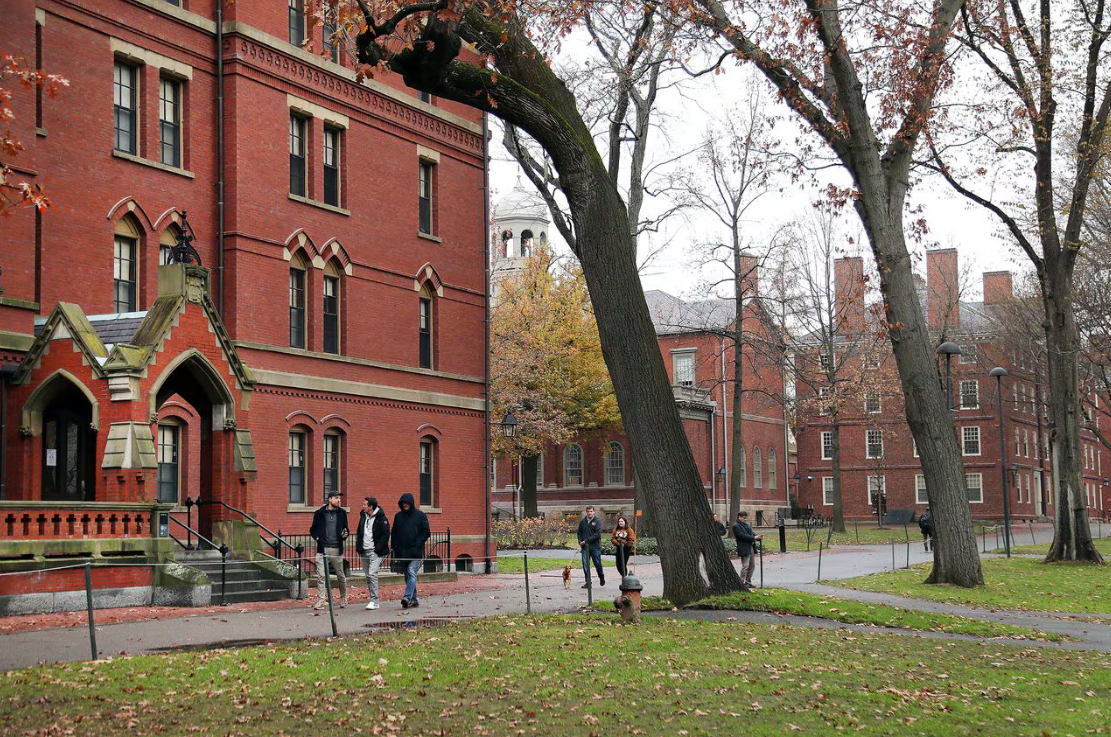哈佛大学恢复 2029 届毕业生的标准化考试要求

【中美创新时报2024 年 4 月 12 日编译讯】(记者温友平编译)哈佛大学将再次要求申请者提交标准化考试成绩,加入少数精英大学的行列,恢复了疫情期间取消的考试要求。《波士顿环球报》记者丹尼尔·库尔(Daniel Kool)对此作了下述报道。
在周四宣布这一政策变化时,哈佛大学引用了越来越多的研究表明标准化考试可以帮助大学从不太富裕的高中发现有才华的学生。耶鲁大学、达特茅斯学院和布朗大学今年早些时候以同样的理由恢复了测试要求;麻省理工学院两年前恢复了标准化测试要求。
此举出台之际,美国顶尖大学正在寻找保持校园种族和社会经济多样性的方法,而不将种族作为招生的一个因素,美国最高法院在去年夏天具有里程碑意义的平权行动裁决中禁止这样做。
哈佛大学文理学院院长霍皮·霍克斯特拉 (Hopi Hoekstra) 表示,标准化考试有助于大学预测学生的成功,无论学生的背景如何。她说,没有提交考试成绩的学生可能无意中隐瞒了可以加强他们整体申请的信息。
霍克斯特拉在周四的一份声明中表示:“从根本上说,我们知道人才是普遍存在的,但机会却不是。” “通过这一变化,我们希望加强我们识别这些有前途的学生的能力,并为哈佛提供机会支持他们作为思想家和领导者的发展,为塑造我们的世界做出贡献。”
由于 COVID-19 大流行限制了一些学生参加考试,该学院在 2020 年放弃了标准化考试要求。 申请人可以选择提交 ACT 和 SAT 成绩来补充其申请。据哈佛大学称,过去四年里,大多数被哈佛录取的学生都这样做了,尽管这不是必需的。
批评者长期以来一直声称标准化考试偏向于来自富裕家庭的学生,他们更有可能参加昂贵的考试准备课程,并且总体上有更好的教育机会。
然而,今年早些时候,哈佛大学附属机会洞察(Opportunity Insights)小组的研究发现,标准化考试可以帮助识别来自低收入背景的优秀申请者,他们的原始分数可能不如高收入学生高,但表现优于他们的同学。 这与一些早期的研究相一致,其中包括加州大学系统委员会的一项研究,该研究发现 SAT 等测试比高中 GPA 更有可能预测学生的成绩。
机会洞察还发现,对传统招生和学生运动员的偏好比要求标准化测试更能限制多样性。
哈佛大学经济学教授兼机会洞察总监拉吉·切蒂(Raj Chetty)在一份声明中表示,标准化考试确实偏向来自高收入家庭的学生,他们可能有更多机会获得考试准备资源。
“但数据显示,其他衡量标准——推荐信、课外活动、论文——更容易出现这种偏见,”切蒂说。“考虑标准化考试成绩可能会让哈佛的招生过程更加精英化,同时增加社会经济多样性。”
哈佛大学肯尼迪学院学术院长戴维·戴明 (David J. Deming) 表示,尽管仍然存在一些障碍,但测试的广泛可用性和普遍性有助于确保公平性。
“并不是每个人都能聘请昂贵的大学教练来帮助他们撰写个人论文。但每个人都有机会在 SAT 或 ACT 考试中取得好成绩,”戴明在一份声明中表示。
韦尔斯利学院经济学教授、高等教育行业专家菲利普·莱文 (Phillip Levine) 表示,哈佛大学的举措进一步证明精英大学正在回归 SAT 要求。
“显然,这也将开始渗透到其他机构,”他说。
但莱文表示,现在判断排他性较低的学校是否会效仿哈佛和其他常春藤盟校的做法还为时过早。
“如果你不需要 SAT,你会收到更多申请。因此,在你寻求更多申请的世界中,重新制定这一要求可能对你不利,”他说。 “在高端市场,你不太担心应用程序,这不是什么问题。”
国家公平与开放考试中心(一个跟踪和批评标准化考试和考试公司的非营利组织)的公共教育主任鲍勃·谢弗(Bob Schaeffer)表示,他预计哈佛大学的政策变化不会在全国大学中掀起波澜。
“常春藤联盟和其他超级精英学校是一般规则的例外,”他说。
谢弗表示,其他学校可能会在下一学年密切关注哈佛大学和其他地方的多样性和学生成功数据,然后再决定是否恢复自己的测试要求。
教育服务公司 Kaplan Inc.(提供 ACT、SAT 等考试准备课程)对全国 200 多所顶尖的可选择考试的文理学院和大学进行了一项调查,其中约 15% 的大学表示他们正在考虑恢复 根据卡普兰的说法,标准化测试要求。大约三分之二的受访学校表示,提交 ACT 或 SAT 成绩有助于学生的申请。
对于无法参加 SAT 或 ACT 考试的申请者,哈佛大学表示将接受一些替代考试,包括先修分班考试成绩和国际文凭考试成绩。
哈佛大学招生主任乔伊·圣约翰表示,参加 SAT 或 ACT 考试的学生可能比过去少了,而参加这些考试可能会给国际申请者带来障碍。
圣约翰在周四的一份声明中表示:“我们希望面临此类挑战的有前途的学生仍然可以通过其他形式的测试来申请。”
莱文表示,拥有更广泛的申请材料可以让招生顾问权衡不同指标的优缺点,这总体上对系统有利。
莱文说:“无论你怎么想,都没有一个完美的衡量标准来衡量你应该接受谁。”
题图:哈佛大学哈佛校院(JOHN TLUMACKI/GLOBE STAFF)
附原英文报道:
Harvard reinstates standardized testing requirement for class of 2029
By Daniel Kool Globe Correspondent,Updated April 11, 2024
Harvard Yard at Harvard UniversityJOHN TLUMACKI/GLOBE STAFF
Harvard College will once again require applicants to submit standardized test scores, joining a handful of elite colleges that have reinstated testing requirements nixed during the pandemic.
In announcing the policy change Thursday, Harvard cited a growing body of research showing standardized tests can help colleges spot talented students from less- affluent high schools. Yale University, Dartmouth College, and Brown University used the same rationale to restore testing requirements earlier this year; the Massachusetts Institute of Technology revived its standardized testing requirement two years ago.
The move comes as the nation’s top colleges search for ways to maintain racial and socioeconomic diversity on campus without using race as a factor in admissions, which the US Supreme Court prohibited in its landmark affirmative action ruling against last summer.
Hopi Hoekstra, dean of the faculty of arts and sciences at Harvard, said standardized tests help colleges predict student success regardless of a student’s background. Students who did not submit test scores, she said, may have unintentionally withheld information that could have strengthened their overall application.
“Fundamentally, we know that talent is universal, but opportunity is not,” Hoekstra said in a statement Thursday. “With this change, we hope to strengthen our ability to identify these promising students, and to give Harvard the opportunity to support their development as thinkers and leaders who will contribute to shaping our world.”
The college dropped its standardized testing requirement in 2020, as the COVID-19 pandemic limited some students’ access to the tests. Applicants had the option of submitting ACT and SAT scores to supplement their applications. The majority of students who matriculated at Harvard in past four years did so, even though it wasn’t required, according to the university.
Critics have long asserted standardized tests are biased toward students from wealthier families, who are more likely to take expensive test prep classes and have better educational opportunities overall.
Earlier this year, however, research by the Harvard-affiliated Opportunity Insights group found that standardized exams can help identify standout applicants from low-income backgrounds whose raw scores might not be as high as upper income students’, but who outperform their classmates. That lined up with some earlier studies, including one from a committee at the University of California system, which found tests like the SAT were more likely to predict student achievement than high school GPAs.
Opportunity Insights also found that preferences toward legacy admissions and student athletes do more to restrict diversity than requiring standardized tests.
Raj Chetty, a Harvard professor of economics and the director of Opportunity Insights, said in a statement that it’s true standardized tests are biased toward students from higher-income families, who may have greater access to test prep resources.
“But the data reveal that other measures — recommendation letters, extracurriculars, essays — are even more prone to such biases,” Chetty said. “Considering standardized test scores is likely to make the admissions process at Harvard more meritocratic while increasing socioeconomic diversity.”
David J. Deming, academic dean of the Harvard Kennedy School, said the widespread availability and the universality of the tests help ensure fairness, though some barriers still exist.
“Not everyone can hire an expensive college coach to help them craft a personal essay. But everyone has the chance to ace the SAT or the ACT,” Deming said in a statement.
Phillip Levine, a Wellesley College economics professor and expert in the business of higher education, said Harvard’s move is more evidence that elite colleges are moving back toward the SAT requirement.
“Clearly, this is going to start filtering down to other institutions as well,” he said.
But Levine said it was too early to say whether less-exclusive schools would follow Harvard and the other Ivies’ lead.
“You get more applications if you don’t require the SAT. So in a world in which you’re seeking more applications, reinstituting the requirement may not be advantageous for you,” he said. “At the top end of the market, where you’re less worried about applications, that is less of a problem.”
Bob Schaeffer, director of public education at the National Center for Fair & Open Testing, a nonprofit that tracks and critiques standardized exams and testing companies, said he did not anticipate Harvard’s policy change would create waves among colleges nationwide.
“The Ivy League and the other super-selective schools are exceptions to the general rule,” he said.
Schaeffer said other schools will likely closely monitor diversity and student success data at Harvard and elsewhere throughout the next academic year before determining whether to revive their own testing requirements.
In a survey of more than 200 of the nation’s top test-optional liberal arts colleges and universities conducted by education services company Kaplan Inc., which offers test preparation courses for the ACT, SAT, and others, around 15 percent said they were considering reinstating standardized testing requirements, according to Kaplan. Around two-thirds of surveyed schools said submitting an ACT or SAT score helps students’ applications.
For applicants without access to the SAT or ACT, Harvard said it will accept a handful of alternative tests, including Advanced Placement exam results and International Baccalaureate scores.
Joy St. John, Harvard’s director of admissions, said there may be fewer students taking the SAT or ACT than in the past, and accessing those tests can create barriers for international applicants.
“We hope that promising students faced with such challenges will still apply, using alternative forms of testing,” St. John said in a statement Thursday.
Levine said having a wider scope of application materials allows admissions counselors to weigh the strengths and weaknesses of different metrics, which is overall beneficial to the system.
“Regardless of how you think about it, there’s no such thing as a perfect measure of who you should accept,” Levine said.

